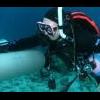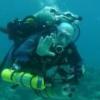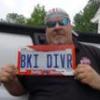
Identify & Avoid
#1

Posted 28 August 2009 - 05:26 PM
Introduction (repeated from scenario #1)
Diving is a pretty safe sport. Most divers are cautious and attentive in the way they prepare for and conduct themselves while diving. They know the rules and limits, they check their equipment over carefully, and they don't push the limits too far or too often. When it comes to injuries, we're probably more likely to get hurt playing softball or soccer than we are to suffer an injury on a dive. But when that unusual circumstance comes along, it's important to have a plan. After all, we can't stay underwater forever, and some problems need to be resolved pronto. We need to think about what could possibly go wrong on a dive, and have a plan for what to do if that "worst-case scenario" should arise.
With this in mind, we'll take a look [individually] at some of the most challenging situations a [recreational] diver can encounter. For each one, we define the scenario, identify the risk factors, examine the likely causes and suggest strategies for avoidance. Then we'll explore the various tactics to deal with the problem just in case it sneaks up on us.
Scenario: Regulator Freeflow
Everything is going fine when suddenly your regulator erupts, spewing out the contents of your cylinder.
Risk Factor: Difficulty breathing, rapid exhaustion of breathing air supply.
Likely Causes: Regulator problems such as freeflow generally stem from poor regulator maintenance, and are made worse by moisture in the cylinder and cold-water temperatures. As compressed air expands in the regulator, the temperature drops, which can cause moisture in the air to freeze. This in turn can unseat a valve. As regulators get cold from air expansion, ice can form on exterior components as well. Incorrectly set interstage pressure can also make a regulator prone to freeflow.
Avoidance: Proper maintenance is critical to regulator reliability. Regulators should be properly rinsed/soaked, to prevent the buildup of salt and mineral deposits that can foul up the valves. Rinse or soak your regulator after each dive, and have it serviced by a professional technician annually. Before diving in cold water, make certain that the regulator has been serviced for cold water, and that the cylinder has been properly serviced and filled.
Dealing with it: While it is often possible to continue breathing from a freeflowing regulator, some divers will experience difficulty due to the torrent of bubbles. If breathing from the free-flowing regulator is not possible, switch to a redundant air source or share air with a buddy. Shut off the cylinder valve to conserve air and stop the bubbling, and make a controlled, normal ascent to the surface. You may need to orally inflate your BC if the cylinder air has been turned off.
#2

Posted 28 August 2009 - 05:39 PM
I have always made it a habit that when I pick up my gear from it's annual inspection, I get right in the pool at my LDS with all my gear on, to confirm it is all working properly. I trust my LDS with my gear, but I take responsibility for my own life. Test the gear after the annual inspection. It's easier to discover & fix a problem in their pool than half a world away on a dive trip!
#3

Posted 28 August 2009 - 06:28 PM
I totaly agree with your statement... I learned the hard way ! last year I took a reg set to a diving location far off from my home and when I got there I found that my first stage was over pressuring my 2nd and Octo regs, If I would have took the time to test my equipment 7-10 days pryor to traveling, I would have saved myself a big headache ! Live and Learn or Learn from others I guess.I trust my LDS with my gear, but I take responsibility for my own life. Test the gear after the annual inspection. It's easier to discover & fix a problem in their pool than half a world away on a dive trip!
Great Thread... TY Tammy
Bubski
no trees were harmed while posting any of my messages,
however a significant number of electrons were inconvenienced.
Buy Lawn Mower and Chain Saw Parts at...
Amazon.com
#4

Posted 28 August 2009 - 06:32 PM
One question - the article mentions getting your regulator "serviced for cold water" at what expected water temperature might that be needed?
#5

Posted 28 August 2009 - 07:16 PM
#6

Posted 29 August 2009 - 07:23 AM
#7

Posted 01 September 2009 - 06:33 PM
#8

Posted 01 September 2009 - 06:54 PM
Yea...in 2007 I had my reg serviced & took a quick dip in the pool to check it out when I picked it up. Primary worked great, so I switched to backup reg. First few breaths & all was well, then...mouthfull of water. They had replaced the mouthpiece on both regs, but forgot to replace the tie-wrap securing the backup, so I was left with only the mouthpiece while the backup reg itself floated beside me! It's much better to discover that in a pool than during an emergency at -80'!!! (better still if I had inspected it first...lesson learned!
)
Same thing happened to me, my mind said everything was ok because I had a mouth piece in my mouth. But my eyes saw a primary just floating away...
Buckeye,
Thanks
Bubski
Bubski
no trees were harmed while posting any of my messages,
however a significant number of electrons were inconvenienced.
Buy Lawn Mower and Chain Saw Parts at...
Amazon.com
#9

Posted 01 September 2009 - 08:32 PM
My metabolic rate is pleasantly stuck.
Let those winds of time blow over my head,
I'd rather die while I'm living than live while I'm dead.
0 user(s) are reading this topic
0 members, 0 guests, 0 anonymous users
















